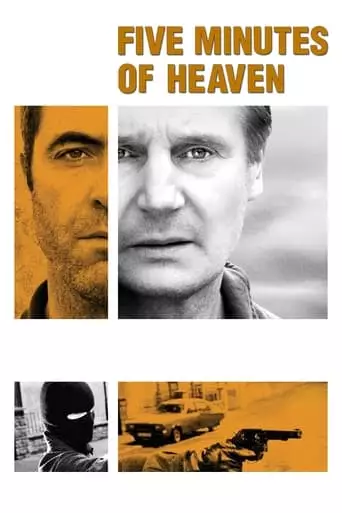The story of former UVF member Alistair Little. Twenty-five years after Little killed Joe Griffen’s brother, the media arrange an auspicious meeting between the two.
Five Minutes of Heaven is a 2009 film directed by Oliver Hirschbiegel, set against the backdrop of Northern Ireland’s Troubles. The narrative unfolds in two distinct timelines:
In 1975, 17-year-old Alistair Little, a member of the Ulster Volunteer Force (UVF), is tasked with executing a reprisal killing. He targets 19-year-old James Griffin, a Catholic man, as part of the ongoing sectarian violence. The murder is witnessed by Griffin’s younger brother, Joe, who is profoundly affected by the traumatic event.
Fast forward to 2008, 33 years later, a reconciliation initiative orchestrates a televised meeting between Alistair Little and Joe Griffin. The intent is to facilitate a dialogue aimed at healing the deep-seated wounds of the past. However, Joe arrives with the intention of confronting his brother’s killer, leading to a tense and emotionally charged encounter.
The film delves into themes of guilt, forgiveness, and the enduring impact of violence on individuals and communities. It explores the complexities of reconciliation, highlighting the challenges of confronting past traumas and the human desire for justice and closure.
Main Themes
- Guilt and Redemption: The film examines the profound sense of guilt experienced by Alistair Little, who grapples with the moral implications of his actions. It portrays his internal struggle and the quest for redemption, offering a nuanced perspective on personal responsibility and atonement.
- The Cycle of Violence: Five Minutes of Heaven highlights how violence perpetuates itself across generations. Joe Griffin’s desire for revenge reflects the ongoing cycle of retaliation, underscoring the difficulty of breaking free from the patterns of violence that define the conflict.
- Forgiveness and Reconciliation: The film explores the complexities of forgiveness, questioning whether true reconciliation is possible after profound loss and trauma. It delves into the emotional barriers that hinder healing and the personal journeys individuals undertake to find peace.
- Identity and Trauma: The narrative delves into how individuals’ identities are shaped by traumatic experiences. Both Alistair and Joe are defined by the events of 1975, and the film explores their struggles with self-perception and the long-term effects of trauma on personal identity.
- Media and Public Perception: The orchestrated meeting between Alistair and Joe is mediated by the media, highlighting the role of public perception in personal healing. The film critiques the commodification of personal trauma and the ethical considerations of exposing private pain for public consumption.
Impact of the Movie
Five Minutes of Heaven received critical acclaim for its powerful storytelling and compelling performances. The film won the World Cinema Dramatic Directing Award at the 2009 Sundance Film Festival, recognizing Hirschbiegel’s direction. Critics praised the film for its unflinching portrayal of the complexities of reconciliation and the human cost of violence. The Guardian described it as a taut, emotionally charged drama that confronts the legacy of the Troubles with unflinching honesty.
7 Reasons to Watch Five Minutes of Heaven
- Compelling Storyline: The film offers a gripping narrative that intertwines personal and political histories, providing a profound exploration of the human condition amidst conflict.
- Outstanding Performances: Liam Neeson and James Nesbitt deliver exceptional performances, bringing depth and authenticity to their complex characters. Their portrayal of Alistair and Joe adds emotional weight to the narrative.
- Thought-Provoking Themes: The film delves into themes of guilt, forgiveness, and the cycle of violence, prompting viewers to reflect on the challenges of reconciliation and the long-term effects of trauma.
- Historical Insight: Set against the backdrop of Northern Ireland’s Troubles, the film provides valuable historical context, shedding light on the personal stories behind the political conflict.
- Emotional Depth: The film’s exploration of deep emotional struggles offers a poignant and empathetic portrayal of its characters, making it a moving and impactful viewing experience.
- Cinematic Excellence: Directed by Oliver Hirschbiegel, the film features strong direction and cinematography that effectively convey the tension and emotional gravity of the story.
- Critical Acclaim: With positive reviews from critics and audiences alike, Five Minutes of Heaven is recognized as a significant contribution to contemporary cinema, offering a nuanced and powerful narrative.
How Will You Feel After Watching Five Minutes of Heaven?
After watching Five Minutes of Heaven, you may experience a profound sense of empathy and introspection. The film’s unflinching portrayal of the complexities of human emotions in the face of past traumas can evoke a deep emotional response. You might find yourself reflecting on the themes of forgiveness, the cycle of violence, and the challenges of reconciliation. The nuanced performances and compelling narrative are likely to leave a lasting impression, prompting contemplation on the human capacity for both harm and healing.

